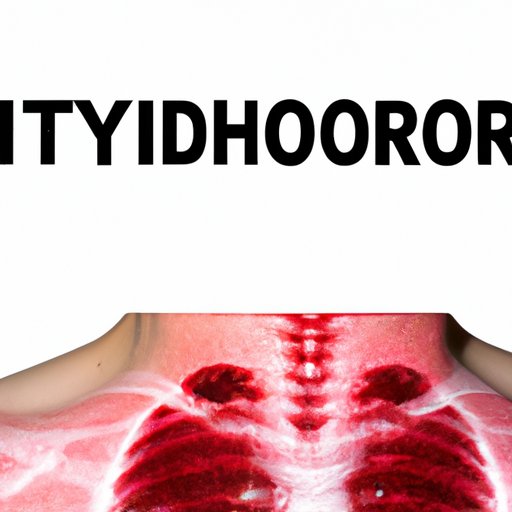
I. Introduction
Hyperthyroidism and autoimmune diseases are two conditions that affect millions of people globally. Although these conditions are distinct, there is a growing body of evidence that suggests that there is a connection between the two. In this article, we will explore the link between hyperthyroidism and autoimmune diseases and how one condition can impact the other.
II. Understanding the Connection between Hyperthyroidism and Autoimmune Diseases
Hyperthyroidism is a medical condition that occurs when the thyroid gland produces an excessive amount of thyroid hormones, leading to an overactive metabolism. On the other hand, autoimmune diseases occur when the immune system mistakenly attacks healthy cells, leading to inflammation and damage to various body systems.
Studies have shown that there is a strong association between hyperthyroidism and autoimmune diseases, with the latter being the primary cause of hyperthyroidism in most cases. In fact, approximately 80% of hyperthyroidism cases in the United States are due to an autoimmune condition called Graves’ disease.
The immune system plays a vital role in the development of autoimmune diseases. The immune system is designed to protect the body from foreign invaders such as viruses and bacteria. However, in cases of autoimmunity, the immune system mistakenly identifies healthy cells as foreign and attacks them.
There are different types of autoimmunity, including organ-specific and non-organ-specific autoimmune diseases. In organ-specific cases, the immune response is directed towards a specific organ or tissue, as seen in Graves’ disease. In non-organ-specific cases, the immune response affects multiple organs or tissues, as seen in systemic lupus erythematosus (SLE) and rheumatoid arthritis (RA).
III. Unraveling the Mystery of Autoimmune-Related Hyperthyroidism
Autoimmune-related hyperthyroidism, also known as Graves’ disease, is a condition that affects the thyroid gland. The condition occurs when the immune system mistakenly produces antibodies that stimulate the thyroid gland to produce excessive amounts of thyroid hormones.
Several factors can contribute to the development of Graves’ disease, including genetics, gender, and environmental factors such as stress and smoking. Women are more likely to develop Graves’ disease than men, and the condition is most commonly diagnosed in individuals aged 20 to 40 years old.
The symptoms of Graves’ disease may vary from person to person but can include weight loss, tremors, increased heart rate, and heat intolerance. Diagnosis of Graves’ disease typically involves blood tests to check thyroid function and the presence of antibodies that stimulate the thyroid gland.
IV. Finding Effective Treatments for Autoimmune-Driven Hyperthyroidism
There are several treatment options available for patients with autoimmune-related hyperthyroidism, and the choice of treatment depends on the severity of the condition and the patient’s overall health status.
The most commonly used treatments for Graves’ disease include antithyroid medications, radioactive iodine therapy, and surgery. Antithyroid medications such as methimazole and propylthiouracil are used to block the production of thyroid hormones. Radioactive iodine therapy involves the administration of radioactive iodine to destroy the thyroid gland cells that produce thyroid hormones. Surgery to remove part or all of the thyroid gland is also an option for patients with severe Graves’ disease or those who do not respond to other treatments.
Advancements in medical technology have led to the development of innovative treatments for autoimmune-driven hyperthyroidism. For example, a recently approved drug called teprotumumab has shown promising results in reducing inflammation associated with Graves’ disease and improving eye symptoms that are often seen in patients with this condition.
V. Exploring the Link Between Hyperthyroidism and Autoimmunity: A Comprehensive Guide
The link between hyperthyroidism and autoimmunity is complex and multifactorial. The immune system has a significant role in the development of hyperthyroidism, and autoimmunity is a common cause of the condition.
Proper diagnosis and management of autoimmune-related hyperthyroidism are crucial for patients to achieve optimal health outcomes. Lifestyle interventions such as stress reduction and dietary changes can also play a significant role in managing hyperthyroidism and autoimmune diseases.
VI. Autoimmune Diseases and Hyperthyroidism: A Complex Interplay
Autoimmune diseases and hyperthyroidism have a complex interplay, and managing one condition can positively impact the other. For example, treating hyperthyroidism can improve the symptoms of autoimmune diseases and reduce the risk of relapse.
Several research studies suggest that patients with autoimmune diseases may have a higher risk of developing hyperthyroidism. Therefore, proper management of autoimmune diseases may help in the prevention of hyperthyroidism in susceptible individuals.
VII. Diagnosing and Managing Autoimmune-Related Hyperthyroidism
Patients with autoimmune-related hyperthyroidism may face unique challenges in managing their condition. Proper diagnosis and management require working closely with healthcare providers to develop an individualized treatment plan.
Resources such as patient support groups and educational materials can help patients better understand their condition and make informed decisions about their treatment options. It is also essential for patients to maintain regular follow-up appointments with their healthcare providers to monitor their thyroid function and adjust their treatment plan as needed.
VIII. The Role of Immune Dysregulation in Hyperthyroidism
Immune dysregulation is a term used to describe a malfunction in the immune system, leading to the development of autoimmune diseases such as Graves’ disease.
Recent research has shed light on the relationship between immune dysregulation and hyperthyroidism. Immune dysregulation may impact the effectiveness of treatment options and affect patient outcomes. Therefore, further research in this area is necessary to uncover new treatment options for patients with autoimmune-related hyperthyroidism.
IX. Conclusion
Hyperthyroidism and autoimmune diseases are two distinct medical conditions that have a complex relationship. Autoimmunity is a common cause of hyperthyroidism, and proper diagnosis and management of autoimmune-related hyperthyroidism are crucial for patients to achieve optimal health outcomes.
Patients with autoimmune-related hyperthyroidism may face unique challenges in managing their condition, but there are several resources and treatment options available to improve outcomes. It is important to work closely with healthcare providers to develop an individualized treatment plan and maintain regular follow-up appointments to monitor thyroid function.
Together, the research and studies on the link between hyperthyroidism and autoimmunity have shed new light on the complex interplay between these two conditions and provided insight into new treatment options for patients worldwide.





